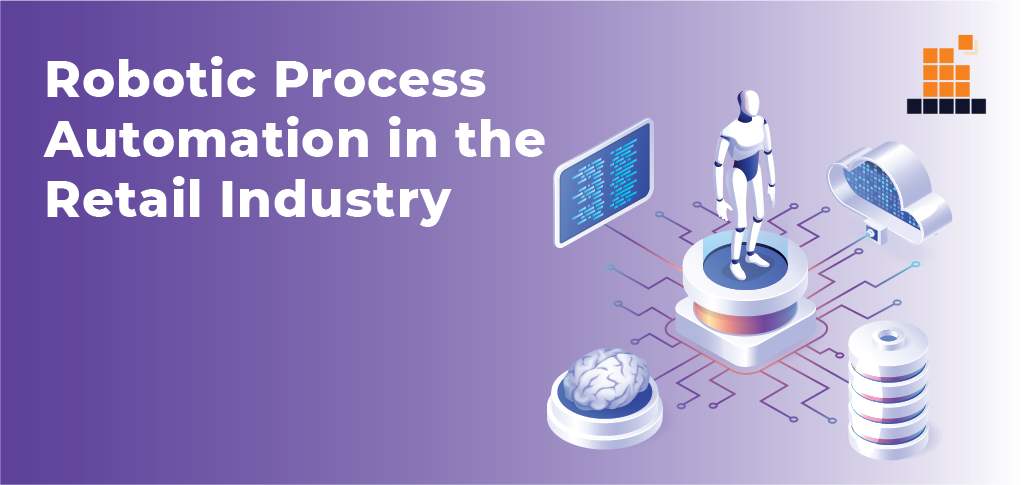We all know about the crisis that the retail industry is going through. The traditional method of retail is not at all useful for the market now. The complexity is increasing in every industry, customer demands are changing and the requirements of high user satisfaction are growing day by day. This is why retail is now facing several challenges. These industries can use the robotic automation process to complement the unparalleled growth and all the complexities that come with it.
Robotic process automation can automate and improve the workflow of several repetitive tasks like customer management, bill generation, inventory management, loyalty scheme management, business reporting, and customer complaints management.
This blog will tell you about the importance, scope, use cases, and benefits of this automation in the retail industry.
Scope of Automation in the Retail sector
Every retail business that has both physical and virtual presence is riding on the very same boat. The cost of the physical store is more because of the involved expense of the real state. Thus the complexity of the retail industry is increasing. This means that whether they sell their products online or offline they will have to strike a chord in between retail elements. RPA allows organizations to automate repetitive activities, optimize overall costs, and accelerate workflows. This helps retailers stay effectively optimized and relevant.
How does RPA help?
Retail can be called the concluding step of a supply chain that consists of any additional costs that keep adding at each stage. Anything that can improve the costs of a product can also improve the profit margins of retailers. Robotic process automation supports a lot of activities in retail like inventory, returns processing, contract management, supply chain, invoice management, and store planning management. Moreover, RPA also supports many other office tasks such as payroll, safety, health, onboarding, staff selection, training, etc. The best part is that the finance department can also optimize its activities around regulatory compliance, payables, receivables, incentive claims, cash flow management, etc. Retail always becomes successful when there are details available. But now, it is high time that businesses should now automate these details and repetitive tasks.
Use cases in RPA
According to the current data, international online sales have increased to 8.8% of the total retail spending in the year 2018. And, it was about 7.4% in 2016. It is also estimated that online sales in the U.S will double by 2023. It will reach up to 20 to 25% of the overall retail space. The industry will surely face some challenges that will need the restructuring of the business processes from top to bottom.
When we compare all these growth numbers to a comparatively slow market, production costs, undependable supply, and increasing label cost, the retail owners can face some challenges in the coming year. Other than this the retail industry is also expected to address all the increasing needs for consumer-centric business execution.
The use cases that are given below are the most common tasks that we can automate within the retail space. But, there are many other tasks where the efforts and errors can be significantly reduced. We can do it through the human workforce with the implementation of valuable resources. The use cases are as follows:
Business and Sales Analytics –
For making retail decisions like churn rate, product introductions, and trade promotions, sales analytics can be the key. RPA in the sales sector can automate sales analytics. It offers data-based real-time reports on the choices of customers and user behavior that is related to several aspects of a product.
Store Planning and inventory management –
RPA will help you analyze the organization to fit all the customer expectations, boost profits, and improve the user experience.
Demand supply planning –
When you will use RPA in retail, your demand for supply planning will be automated. You will be then able to make data-driven decisions for customer support, capacity and asset management, etc.
Marketing planning –
Trade promotions need data gathering and analysis. It is the main requirement and without it, it is impossible to prepare the trade promotions. RPA can achieve this in much less time with higher efficiency.
Product Categorization –
RPA can greatly improve categorization accuracy by 98.5%. After deploying RPA, you will be able to correctly place many products in the appropriate categories based on user-related factors.
ERP Management –
Enterprise resource planning includes account payables, billings, price changes, receivables, etc. When these activities automate, it reduces human efforts to a great extent.
Customer support and call center processes –
Whether it is order payment or delivery, the RPA bot can send every update to the customers. It can also be configured to address several user queries and take feedback from them.
Logistics and supply management –
When we deploy RPA in retail to automate the supply chain and logistics, we improve the collaboration between customers, suppliers, and distributors. We are then also able to enhance the working of our employees.
Benefits
The use of robotic process automation in retail industries can help retailers in organizing complicated tasks like compliance and audit regulation. When we automate these kinds of activities employees can get time for other complex and strategic tasks. The benefits that RPA provides are as follows:
- Optimized operational costs
- Decreased delivery risks
- Better auditing
- Improved compliance
- Multi-tasking support
- Better inventory management
- Enhanced user support
- Improved application integration
Final Thoughts
All the retail businesses and industries can make use of the capabilities of RPA to structure the processes and improve their customer delivery services. With the help of automation, several needs of executing the repetitive and manual tasks will be greatly eliminated. A lot of money can be saved by automating the processes and tasks done by humans. When it is about the retail industry, utilizing RPA becomes supreme.
